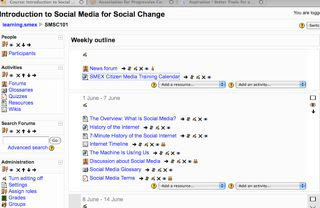I finally got around to drafting a somewhat coherent course overview today. I would really rather be writing a post about translation, since that seems to be a hot topic this week, but I can’t do it justice just yet. So in lieu of our thoughts on important young players like yamli.com and meedan.net, here’s our plan for the summer training of trainers.
Today, several people are convening to take a look at the plan and offer their expert advice. Tomorrow, I’ll edit the post according to what we decided on so that others can have a look at the process. Hope this isn’t too boring.
SMEX TOT Course Overview
The SMEX training-of-trainers course in citizen media is designed for self-directed, change-seeking individuals with intermediate digital literacy (computers, cameras, Internet) and a solid reading and writing knowledge of English. That said, we are dedicated to making as much of the training as possible available in Arabic—and eventually all of it—it will just happen at a slower pace.
The training will take place in two five-week segments, an introductory segment that covers the basic concepts of social media and how it is being used for social change, including case studies in blogging and social networks. It will also cover the basics of taking digital photographs in the context of peacebuilding and youth empowerment. Successful completion of the introductory course will make participants eligible for the advanced course, which will allow each trainer to choose one or two areas of the social web for deeper focus, especially as it relates to peacebuilding and youth empowerment. Audio, video, and mapping production skills will also be taught in field workshops with qualified instructors. More information on specific course modules can be found below:
Introduction to Social Media for Social Change
Week 1: What Is Social Media?
Skills: Better search
Week 2: What Does Social Media for Social Change Look Like?
Skills: Tagging
Week 3: Blogging for Empowerment
Skills: Setting up a blog, commenting, RSS feeds, Twitter, Crossposting
Week 4: Organizing and Information Sharing with Social Networks, Working Wikily
Skills: Setting up profiles and/or a Ning network, Wiki editing
Week 5: Digital Photography
Skills: Getting to know your camera, lowering resolution, uploading photos, taking pictures for social change
Topics in Social Media for Peacebuilding and Development*
Common module: Strategic planning for campaigns and communication
Common module: Building facilitation skills
• Elective track: Citizen reporting
• Elective track: CMS websites
• Elective track: Online project management
• Elective track: Mapping
• Elective track: Translation challenges
• Elective track: Online audio for advocacy
• Elective track: Online video for advocacy
• Elective track: Gaming for change
• Elective track: Youth activism
• Elective track: Building communities
• Elective track: Mobiles
• Elective track: Information visualization
• Elective track: Email newsletters and contact management
*We don’t pretend to be experts in many of these tools, but rather will aggregate and filter some of the key resources to help guide trainers through a self-study process. Participants can go deeply into one track or skim over several, depending on their motivations and aims. Everyone is welcome to join the audio, video, and mapping trainings.
Each five-week segment will be hosted on an open-source learning management system called Moodle (to be hosted at learning.smex.org, with Arabic and English interfaces enabled). Only facilitators and training participants will be allowed access to the courses for the time being. Each week a new module will be posted with various resources and assignments. (We will also distribute a DVD at the introductory training with many of the resources, especially videos, in offline copies, as a means of avoiding lots of slow or interrupted downloads.)
It is essential that each trainer complete the assignments and participate in the group discussion. Depending on your digital literacy and/or level of English, we estimate that you will spend between 4 and 7 hours on coursework each week.
Moodle allows for the course facilitators to follow each person’s progress. During the course, SMEX will review your progress to determine at the end whether you’re eligible for a certificate of completion and/or to enroll in the advanced course. Participants in the advanced course will be required to complete a final project, either alone or, ideally, working in a group.
Once achieving a level of comfort in a particular topic, participants in the introductory course are encouraged to organize and lead trainings in their own communities, either alone or with a partner. Participants in the advanced course will be required to organize such trainings and/or to provide one-on-one consulting to local organizations to qualify for the certificate of completion and the opportunity to consult with NGO winners of the concurrent ideas competition. In June, after the elections, trainers will also be asked to help facilitate the regional information sessions that will announce the ideas competition and help guide local nongovernmental and community-based organizations through the application process.
Constructive comments and suggestions welcome.


